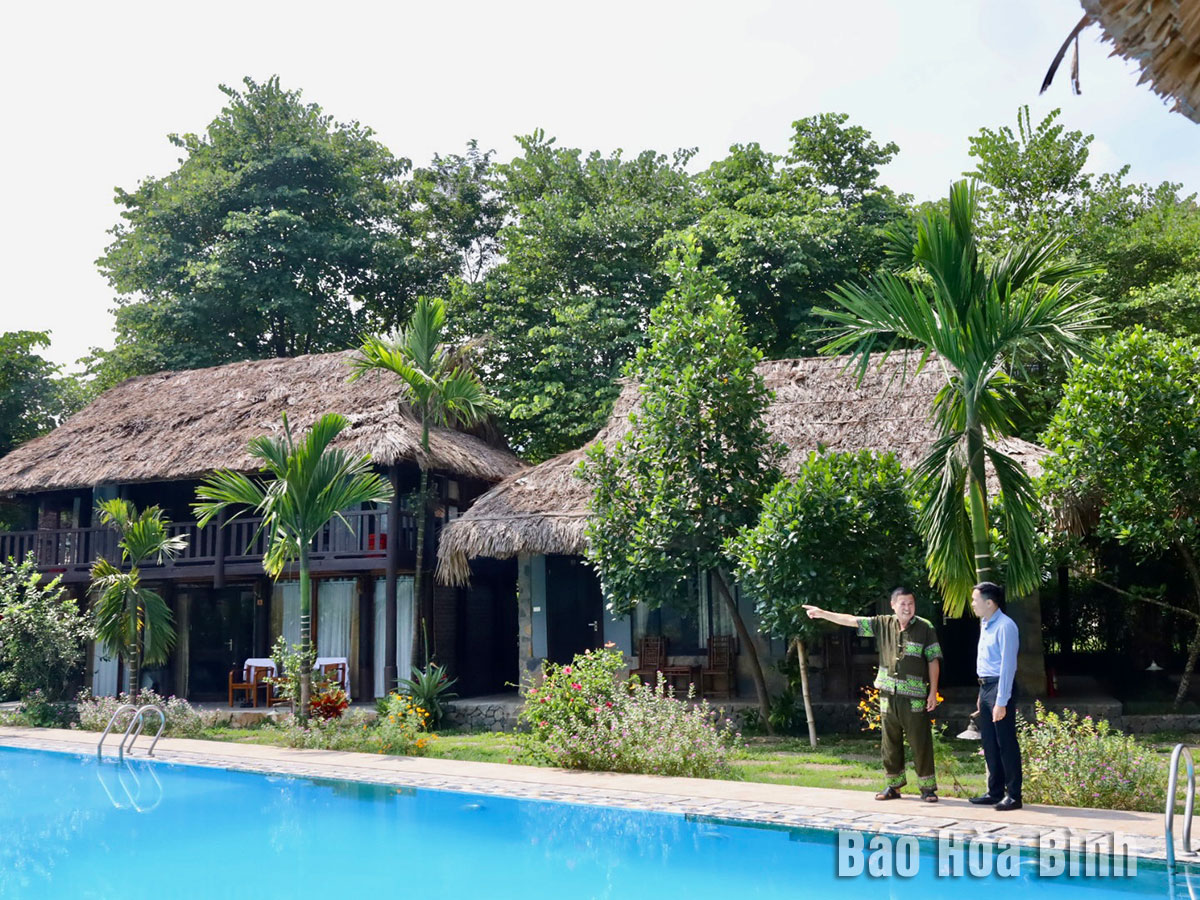
In mid-October, Ha Van Sem (born in 1959), a Thai ethnic and a member of the farmers’ association of Na Chieng hamlet, Na Phon commune (Mai Chau), was the only representative of Hoa Binh province to be named in the top 100 outstanding farmers nationwide

Ha
Van Sem (far left), an outstanding Vietnamese farmer in 2023, succeeds with a
model of community-based tourism associated with high-end resort services.
Sem shared: "My family has been doing this
job since 2017. In the process of accumulating experience and expanding the
model, I fearlessly built several stilt houses and works to serve tourists.
Having achieved the current results, I do not forget the encouragement and help
of all-level agencies, especially the district and commune farmers'
associations, which have created conditions for me to approach, grasp market
needs, and take vocational classes on tour guides, cooking, and restaurant
management.”
Currently, his family has a spacious,
environmentally friendly homestay with service prices ranging from 1.5 - 2
million VND (61-82 USD) per stilt house per day. Tourists can rent luxury
accommodations fully equipped with living amenities for 1.5 million VND per
room per day.
Currently, many tourists choose Sem's
homestay facility. He himself is continuously learning and gaining experience
to serve visitors thoughtfully and increasingly professionally. In 021 - 2023,
his facility has achieved an average revenue of 1.3 billion VND a year, with a
profit of 700 - 800 million VND. Sem’s model is welcoming more and more foreign
visitors, mainly from Europe and Asia, along with domestic holiday-makers from
Hanoi, Hai Phong, Quang Ninh, and Thai Binh. The facility creates jobs for 11
labourers with an average income of over 5 million VND a person a month.
In particular, as a "leader" of
farmers working in tourism, he personally actively helps other members by
creating jobs from tourism-related services, encourages others to protect the
environment, ensure food hygiene and safety, and get engaged in social work and
movements in the locality. He also regularly encourages and helps association
members to develop business and tourism services imbued with Thai ethnic
identity.
The Department of Education and Training of Hoa Binh province held a conference on March 18 to review the performance of the "Safe and Happy School" Project and set out tasks for 2025. The project, funded by the Taiwan Fund for Children and Families (TFCF), aims to create a safe, inclusive, and supportive learning environment for students. The event saw the attendance of representatives from the TFCF and 26 beneficiary schools.
With over 70% of their workers being women, trade unions across industrial parks (IPs) in Hoa Binh have been actively safeguarding their legal rights and interests while implementing initiatives to improve their income and well-being.
In recent years, the Hoa Binh provincial General Hospital has continuously innovated itself and improved the quality of medical services to meet the increasing needs of local people. With substantial investments in infrastructure and modern equipment, along with a team of highly qualified doctors and nurses, the hospital has gradually established itself as one of the leading medical units in the Northwestern region and a trusted destination for healthcare for people inside and outside the province.
From mastering the fundamentals of programming to achieving national recognition, the Programming Club of the Le Van Tam Primary School (STAR LVT28) in Hoa Binh city has made remarkable strides in the field of robotics.
The Ho Chi Minh Communist Youth Union Committee and the Vietnam Youth Federation chapter of Hoa Binh province organised a programme on March 12 to launch the "Digital Literacy" movement and an online quiz on the resolutions of the Vietnam Youth Federation congresses at all levels, as well as the Politburo's Resolution No. 57-NQ/TW on breakthroughs in the development of science, technology, innovation, and national digital transformation.
As climate change grows more unpredictable, the development of production forests has become essential - not just for economic growth, but for safeguarding the environment and maintaining ecosystem balance. By boosting local incomes, curbing natural disasters, preventing soil erosion, and protecting water resources, these forests play a crucial role in sustainable development.



